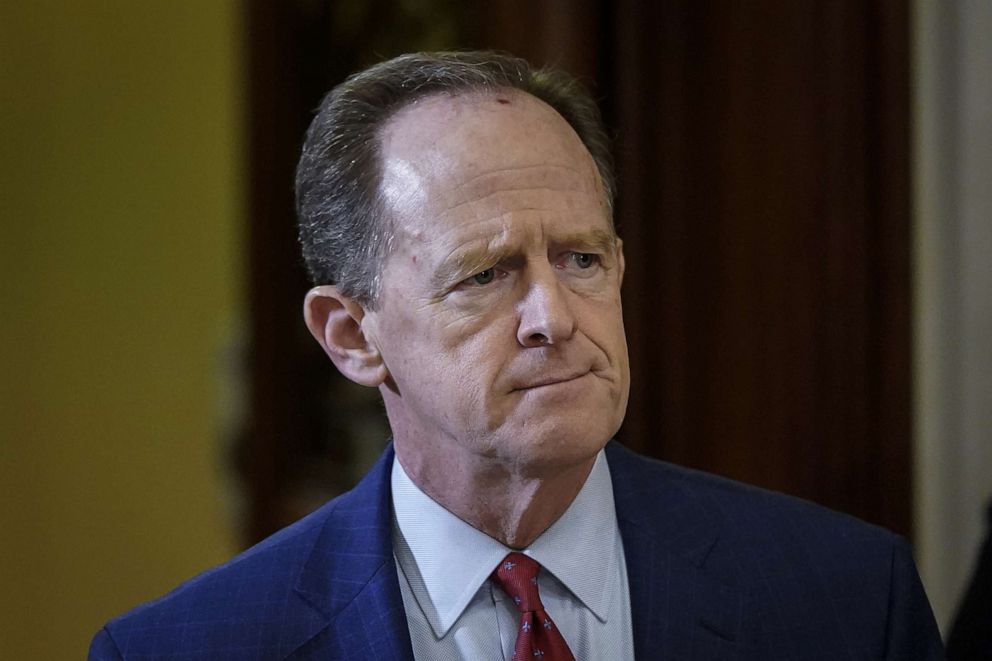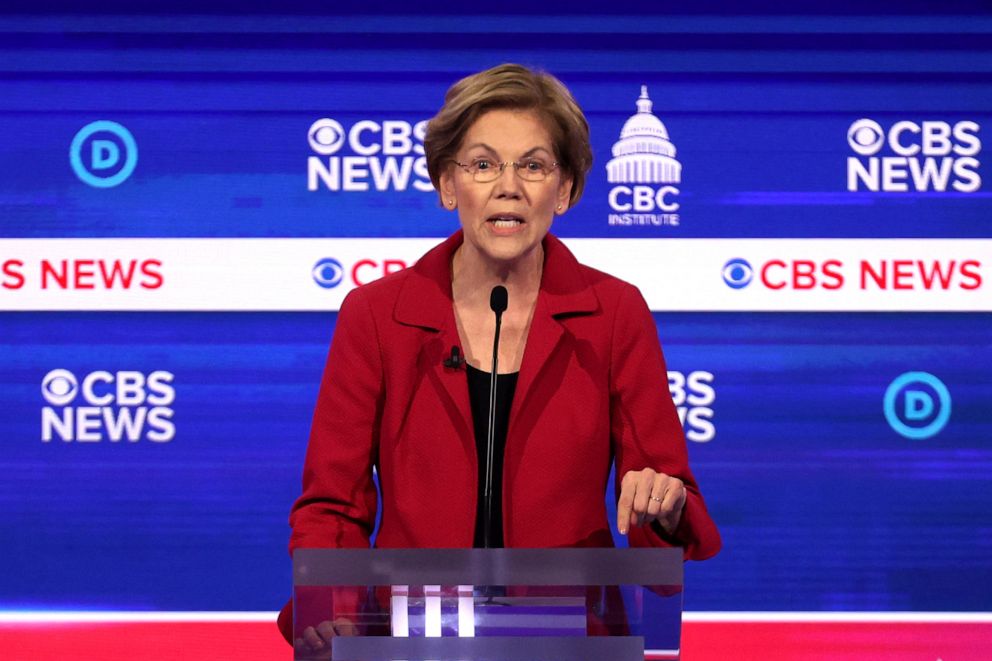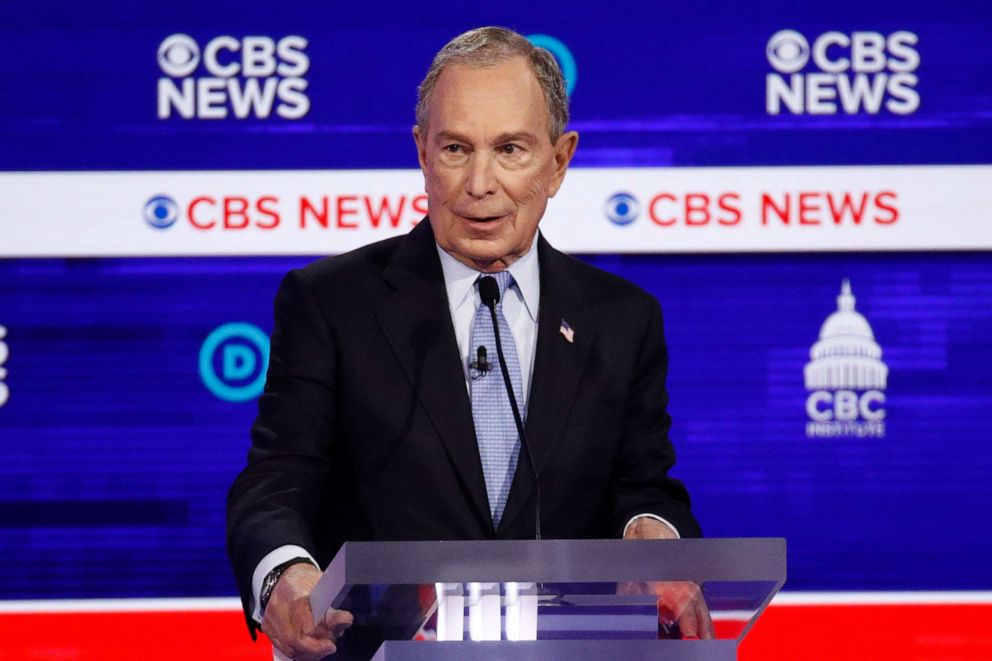Bloomberg's millions for Republicans drawing Democrats' fire
He's spent millions boosting Republicans and hundreds of millions more for Dems.
Former New York City Mayor Mike Bloomberg, who’s made his major contributions to Democrats and liberal causes a central part of his pitch to Democratic primary voters, highlighted his efforts in Tuesday’s debate arguing that, unlike others on the stage, he’s achieved results.
"I have a 6-million-person organization around this country, Moms Demand Action, and Everytown," he said to applause on the Charleston debate stage.
While he’s also touted the roughly $100 million he spent to support House Democratic candidates in 2018, his critics seized on the millions he spent earlier in his political career to boost Republicans for the House and Senate.
"I don't care how much money Mayor Bloomberg has," Sen. Elizabeth Warren, D-Mass., said during Tuesday’s debate, citing Bloomberg’s contributions to several GOP senators to make the case he’s out of step with primary voters.
"The core of the Democratic Party will never trust him. He has not earned their trust. I will. And the fact that he cannot earn the trust of the core of the Democratic Party means he is the riskiest candidate standing on this stage."
Over past two decades, Bloomberg has funneled more than $160 million to various political candidates and groups across the political spectrum. While most of that money has gone to Democrats, it also includes at least $12 million to boost Republicans in Congress, according to an ABC News review of his campaign spending. Vast majority of his spending in both sides came from within the past three election cycles.

In 2016, Bloomberg spent $6 million through his Super PAC Independence USA to support pro-gun control Republican Sen. Pat Toomey of Pennsylvania, who beat Democratic candidate Katie McGinty by fewer than 90,000 votes. Bloomberg's pro-gun control group Everytown for Gun Safety also endorsed Toomey in his re-election bid.
Bloomberg also has spent millions backing other House and Senate Republicans, supporting several as recently as 2018, including New York Rep. Dan Donovan. He’s argued that his experience leading the largest city in the country and his multi-billion-dollar financial data and communications company will make him an effective president who Democratic primary voters can trust.
Bloomberg’s super PAC spent nearly $3 million in support of then-Illinois Rep. Bob Dold between 2012 and 2014 as well as millions more in support of other Republicans running for both the House and Senate over the years.
Bloomberg gave $250,000 to a super PAC supporting South Carolina Sen. Lindsey Graham's re-election bid in 2014 and in 2012 raised money for then-Sen. Scott Brown's re-election bid against challenger Elizabeth Warren. Bloomberg also donated to a number of other Republicans in Congress over the years, including Sens. John McCain and Susan Collins.
Bloomberg also gave to former President George W. Bush and Rudy Giuliani.
He and his aides have repeatedly pointed to his spending on behalf of Democrats in the recent debates to defend his credentials.
"Mike understood that the president represented an existential threat to this country and that we needed to do everything we could to flip the House to make sure that we had accountability in Congress," senior adviser Howard Wolfson said in the debate spin room Tuesday night. "Mike helped flip 21 [House seats], helped make Nancy Pelosi speaker, help make impeachment possible, help hold this president accountable," he added. "I don’t think there's anybody in the country who has done more to help Democrats to hold this president accountable than Mike Bloomberg."

Bloomberg made the same point in the debate, arguing that he helped "put Nancy Pelosi in charge" and gave Democrats "the ability to control this president," though Republicans seized on the end of his remarks, when he nearly appeared to say he "bought" the Democratic majority.
"Let's just go on the record. They talk about 40 Democrats. 21 of those were people I spent $100 million dollars to help elect," he said Tuesday. "All of the new Democrats that came in, who put Nancy Pelosi in charge, and gave the Congress the ability to control this president, I b-- got them."
It’s not clear that Democratic voters will take Bloomberg’s spending on behalf of Republicans into consideration when he first appears on primary ballots on Super Tuesday.
Seth Masket, director of the Center of American Politics at the University of Denver, says Bloomberg's support for Republican candidates could be a potential liability in the Democratic primaries and caucuses, though it could be helpful for him in a general election as it can be seen as a sign of moderation.
"The voters and activists who participate in these generally look for signs that one is loyal to the party, and Bloomberg’s donations to Republican candidates compromise that, as does his past as a Republican officeholder," Masket told ABC News. "To be sure, some who participate on the Democratic side are independents and aren’t so bothered by this, but many of those voters are more sympathetic to Bernie Sanders."
Larry Sabato, director of the University of Virginia Center for Politics, says Bloomberg's past givings doesn't help him but he can easily couch it away with his hundreds of millions of dollars of spending in support of Democrats.
"All you have to do is pick a couple of bad guy Republicans like Rudy Giuliani and George W. Bush -- you can pick the ones that are really offensive to Democrats, but the bad effects will be overwhelmed by my hundreds of millions of dollars of completely positive ads," Sabato told ABC News. "If you bring up Giuliani and Bush, Democrats won't like it, but they're much more concerned about Trump than they are anybody else. They know he's spending a lot of money not just for his candidacy, but to go after Trump and that that gives him an entree."
And Bloomberg is doing just that -- just three months into launching his presidential campaign, he has spent more than half a billion dollars on ads introducing himself to voters and promoting his record of fighting for gun control and other liberal issues.

Kyle Kondik, an elections analyst at the University of Virginia Center for Politics, says how this will affect voters depends on how widely Bloomberg's rivals' messages reaches them and whether Bloomberg's unprecedented level of spending can fend off attacks remains to be seen.
"His candidacy is kind of hard for me to get a handle on," Kondik said. "I just I know that the level of spending is something we really haven't seen before, but also this the strategy of getting in the race and skipping the initial kickoff contests, it's not something we've really seen any great effect in the past."concerns about Bloomberg’s money, which he has pledged to use to support the Democratic nominee and defeat Trump even if he doesn’t win the primary, could persist in the 2020 campaign: Jeff Weaver, a senior adviser to Sen. Bernie Sanders, told reporters that the Vermont senator would not accept Bloomberg’s money if he wins the nomination.
"It’s a hard no," he told reporters after Tuesday night’s debate. "Bernie has said he’s going to fund his presidential campaign with small-dollar contributions, and I think we can do that. I think we can raise over a billion dollars in small-dollar contributions."
Because individuals are limited in what they can directly contribute to presidential candidates under campaign finance regulations, Bloomberg’s aides have signaled that any general election campaign would more likely be a sustained effort against Trump in key battleground states, should the former mayor not win the nomination.
"A lot of people recognize he may be one of the keys to victory in the fall if he's not the nominee," Sabato said. "If he really is going to follow up and give a billion dollars as he as he has said repeatedly, then he will be one of the keys to victory, because otherwise Democrats are going to be vastly outspent by Trump and related PACs."




